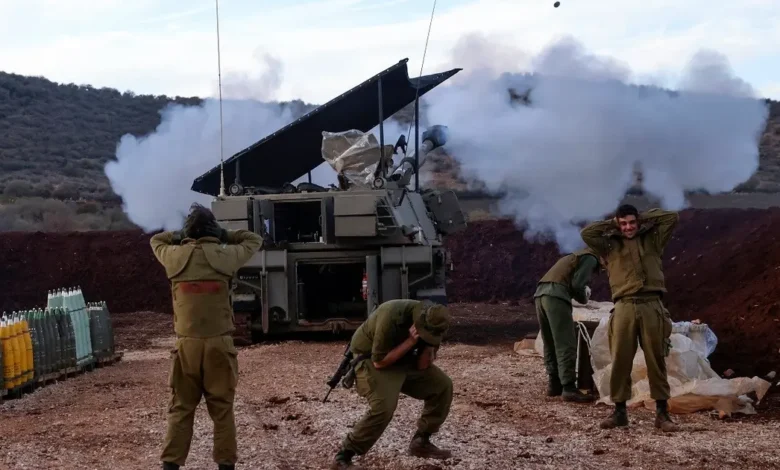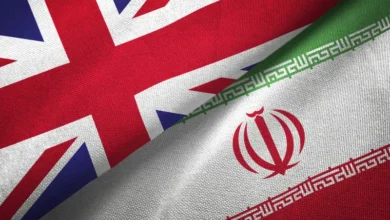Biden orders task force as US fears grow over potential Lebanon-Israel war

President Joe Biden has instructed one of his top aides to lead efforts to prevent a potential war between Lebanon and Israel, according to sources familiar with the matter.
Amos Hochstein will head a team of US diplomats and officials to increase diplomatic efforts and explore ways to avert a conflict as US concerns grow that Prime Minister Benjamin Netanyahu may look to open a new front.
Asked about Biden’s deployment of Hochstein to calm the situation, a White House National Security Council official said that the US president had made clear that the US does not support the Gaza conflict expanding into Lebanon.
“From the beginning, [Biden’s] message to any actor seeking to exploit the situation has been clear: don’t,” the NSC spokesperson told Al Arabiya English in an e-mailed statement. “The United States has strengthened our own deterrent posture in the region, and we are committed to helping restore calm along the Blue Line through a combination of deterrence and diplomacy.”
Since the Oct. 7 Hamas attack on Israel, the US deployed aircraft carrier strike groups and thousands of troops and other assets to the Middle East in what senior defense officials said was intended to serve as a deterrent signal to Iran, Lebanon’s Hezbollah and any other proxy in the region thinking about opening a second front against Israel.
Officials from the White House, State Department, and Department of Defense have been in close contact with their counterparts in Lebanon and Israel so “both the Israelis and Lebanese can return to their homes and live in peace and stability,” said the NSC official.
US officials moved quickly after the Oct. 7 Hamas attack on Israel to dissuade the Netanyahu government from launching a preemptive strike on Iran-backed Hezbollah on its northern border with Lebanon. Washington feared such a move would spark a larger regional war.
Hochstein, previously the presidential special envoy for global infrastructure and energy security, moved from the State Department to the White House recently. He is now the president’s senior advisor for energy and investment. Hochstein has a history of shuttling back and forth between Lebanon and Israel dating back to his days in the Obama administration.
Biden asked Hochstein early in his term to see if a maritime border deal could be finalized after a decade of US diplomacy. He succeeded in mediating the deal that saw the two countries technically in a state of war agree on demarcating their maritime borders with the hopes of benefiting from offshore natural gas reserves.
Now, Biden wants to make sure another war does not start under his term, which has been haunted by foreign policy debacles, including the chaotic withdrawal from Afghanistan.
Palestinian groups based in Lebanon began launching rocket attacks from the country’s southern border in tandem with the ensuing war that broke out between Israel and Hamas. While Israel held Hezbollah accountable for attacks launched from Lebanon and responded to these strikes, the Iran-backed militia began its own operations against Israel.
In the first days of the Gaza war, Hezbollah was targeting military sites and open areas while Israel would respond with white phosphorus, artillery, and airstrikes on Hezbollah outposts and empty civilian areas. However, there have been several instances of both sides widening their targets since then.
Israel has also killed multiple Lebanese journalists and several civilians, including a family of three sisters, between the ages of 10 and 14. Israel said it was investigating the killing of a Reuters journalist in Lebanon as a result of an attack, for which Beirut and the outlet of the reporter – Issam Abdullah – held the Israeli army responsible.
In early December, Israel struck a Lebanese Armed Forces (LAF) base, killing a Lebanese soldier and injuring others. Although the Israeli military issued a rare public apology, it continued to strike civilian areas and kill more Lebanese civilians. On Thursday, an elderly woman was killed and her husband wounded after an Israeli strike in south Lebanon.
But the growing unease in Washington is that the Netanyahu government could launch a new war on Lebanon as the fighting in Gaza has yet to provide Israel with something it can call a victory.
“There’s great concern by the US that Israel may want to escalate. Having said that, the general feeling in Washington is that neither side wants to do that, and in that sense, they’re looking for a diplomatic solution as quickly as possible,” said Ed Gabriel, the President and CEO of the American Task Force for Lebanon.
Gabriel lauded the Biden administration’s efforts to try to prevent this war, pointing to the selection of Hochstein to specifically work on reducing tensions between the two. “I feel like that is a priority today.”
US diplomats and military officials have also expressed their concerns in public and in private.
“The United States has made clear we do not want to see the conflict in Gaza expand into Lebanon,” a State Department spokesperson told Al Arabiya English, echoing the NSC official’s sentiment.
“Lebanon is not a party to the conflict, and attacks launched by Hezbollah and other groups from Lebanon are extremely dangerous,” the official said, adding that these attacks were leading to a cycle of retaliatory acts from Israel that led to some of the casualties in Lebanon, including the Lebanese soldier.
Another US official, who spoke on condition of anonymity, said the Lebanese Army was an “essential institution” to the stability and security of both Lebanon and the region.
Asked what the sense was in Beirut, Joe Bahout, the director of the Issam Fares Institute at the American University of Beirut (AUB), said: “Anxious, of course, but not panicking.”
Bahout said that there were some Israelis who had an appetite for a war on Hezbollah. “But instead of solving their problem, it would compound it,” he said.
Israel’s calls for new Hezbollah agreement
Israeli officials have said in public that they are open to reaching a diplomatic deal with Hezbollah that would push them away from the border and allow Israelis to return to their homes in the north. Thousands have fled and been evacuated in recent weeks as the fighting escalates. The UN said that as of Dec. 12, more than 64,000 Lebanese individuals had been displaced from south Lebanon due to the ongoing hostilities along the Blue Line.
If no deal is reached, which the French have dubbed a “buffer zone,” Israel has threatened to turn Lebanon into Gaza.
An Israeli military spokesman doubled down on the threat to attack if an agreement can’t be reached to push Hezbollah away from the border, according to the Wall Street Journal.
Israeli threats against Lebanon to return it “to the Stone Age” are not new, and there may be widespread support among the Israeli public for a war on Hezbollah, according to some US officials.
Some of this support could encourage embattled Israeli Prime Minister Benjamin Netanyahu as he struggles to garner backing for the way he is conducting the war on Hamas that has led to the killing of tens of thousands of Palestinian civilians. A war on Hezbollah could divert attention from him and his government’s failure to detect the Oct. 7 Hamas attack on Israel.
“But the [US] president has made very clear that the US will not support a war on Lebanon, and Israel will be on its own,” said a second US official, also speaking on condition of anonymity.
Netanyahu has been losing US public sentiment and support and Biden’s in recent days. He’s also been unable to secure the release of the remaining Israeli hostages and has yet to declare “victory” over Hamas.
That, coupled with the need for munitions and defense support from the US for a new war, is not a guarantee for an operation that doesn’t have the backing of Washington.
Pentagon officials have warned their Israeli counterparts against opening a new front. Israeli military officials have received this message well, including its top general, US military officials said. “But, at the end of the day, [the Israeli military] has to answer to their [political class],” the first US official said.
While the US continues to stress to Israel and its army that it must limit targeting Lebanese civilians, UN personnel, civilian infrastructure, civilian farmlands and the LAF, Washington has also warned Lebanon and its officials that it can’t be a launchpad for attacks against Israel.
One of the ideas being floated is a cessation of cross-border attacks between Lebanon’s Hezbollah and Israel, allowing residents on both sides of the border to return to their homes. Israel has said it wants Hezbollah fighters to retreat north of the Litani River, which appears unlikely.
A potential agreement may be pitched where Hezbollah pulls away from the border under an agreed distance while the Israelis would also pull back the same distance on their side of the border.
In either case, “Hezbollah is not going to be able to sit at the border with their guns pointed at Israel when it’s all said and done,” one of the US officials said.
Sources familiar with Hezbollah’s thinking say that the group will not discuss or approve of any potential deals until the fighting in Gaza ends.
A more likely agreement that may be acceptable to all sides would be the full implementation of the 2006 UN Resolution 1701, which calls for a permanent ceasefire. The resolution also calls for, among other things, an area free of any armed personnel, assets and weapons other than those of the Lebanese government and UN peacekeepers between the Blue Line and the Litani River.
Hezbollah operates and has fighters, missiles and rockets near the border. Israeli forces still illegally occupy parts of Lebanese territory; its warplanes fly over Lebanon on a near-daily basis and launch attacks on Syria from Lebanese lands.
For now, the unspoken rules of engagement are largely intact and Israel has not launched an all-out war despite some fears.
“I think there are enough cool-headed Israeli planners to put some breaks on this temptation,” Bahout said.










